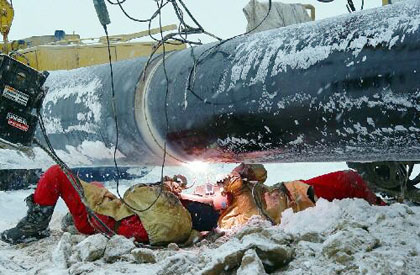ALATAW PASS, Xinjiang: Crude oil from Kazakhstan began flowing into Xinjiang
in Northwest China Thursday, the first time a pipeline has been used for
imports.
Experts say the piped oil would increase supply, improve energy security and
provide an ideal outlet for Kazakhstan's exports.

A worker performs on a
welding operation of the China-Kazakhstan oil pipeline in this undated
photo. The costs for the 960-kilometer pipeline amounted to US$700 million
and the designed capacity is to pipe 20 million tons of oil to China each
year. [Xinhua] |
The first-phase 962-kilometre pipeline which originates in Atasu, Kazakhstan
was completed late last year at an expenditure of US$700 million. The two
countries split the construction costs.
The pipeline will pump 10 million tons of crude a year, the amount doubling
when the project is completed in 2011, linking Atyrau on the Caspian Sea. The
total length of the pipeline would then be around 3,000 kilometres.
The pipeline is designed to eventually carry 20 million tons annually,
equivalent to 140 million barrels.
"It means a lot for China's oil security," said He Jun, a Beijing-based
energy analyst at Anbound Consulting. "Twenty million tons are about one-sixth
all of China's imports."
China imported 127 million tons of crude last year, which made up about 40
per cent of total consumption.
Liu Hequn, a senior analyst at the planning institute of China National
Petroleum Corp, said the pipeline was also a timely boost for China at a time
when it is in talks with Russia for a proposed pipeline to deliver Siberian oil
to the northeast.
That line could be built by 2008 and carry about 19 million tons a year.
China and Russia are also in talks over a cross-border natural gas pipeline
which may run through Heilongjiang in the northeast or Xinjiang, with an annual
capacity of 30 billion cubic metres. Last year, China consumed about 48 billion
cubic metres of natural gas.
Currently, most of China's oil imports come from the Middle East and Africa,
a lengthy journey by sea and passing through the Strait of Malacca which is
vulnerable to piracy or other disruptions.
Industry insiders hailed the new pipeline as beneficial to both countries.
"It provides a direct link between Kazakhstan's rich oil resources and
China's robust market," said Yin Juntai, deputy general manager of China
Petroleum Exploration and Development Company.
The pipeline was jointly developed by China National Petroleum Corporation
(CNPC) and Kazmunaigaz, the Kazakh state energy company.
Kairgeldy Kabyldin, vice-president of Kazakhstan National Petroleum and
Natural Gas Company, called the pipeline a "new paradigm of co-operation."
China has completed laying a 252-kilometre oil pipeline from Alataw Pass to
Dushanzi where the refinery's capacity will be expanded to 10 million tons a
year by 2008.
With crude prices continuing to stay high on the international market, the
Chinese Government on Wednesday raised the prices of gasoline, diesel and
aviation fuel by 500 yuan (US$62.4) per ton, a 10-per-cent rise. It was the
ninth and the biggest price hike for refined oil products since July 2003.
In the pipeline
Kazakhstan, which has huge reserves in the Caspian Sea, produced 50 million
tons of crude oil in 2002 (the most recent data available). About 70 per cent of
its oil is exported. The country's oil output is expected to top 100 million
tons by 2015.
China produced 182 million tons of crude oil in 2005, a figure expected to
reach 195 million tons by the end of 2010.
The pipeline will nearly quadruple imports of Kazakh crude to 4.75 million
tons, or 33.25 million barrels, this year from 1.3 million tons, or 9.1 million
barrels, last year.
That amount will rise to about 8 million tons, or 56 million barrels, in
2007.